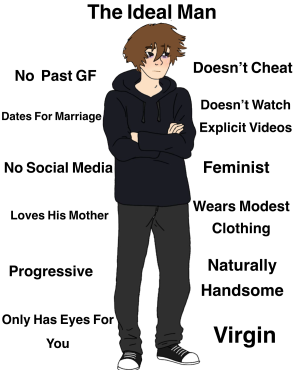Ideal man: Difference between revisions
No edit summary Tags: Mobile edit Mobile web edit |
No edit summary Tags: Mobile edit Mobile web edit |
||
| Line 1: | Line 1: | ||
''' | The '''ideal Man''' is a sociocultural concept describing a [[Moid|male]] partner who embodies moral integrity, emotional maturity, and relational responsibility. | ||
The concept is primarily discussed within the context of [[Femcel|female involuntary celibacy]], as it contrasts sharply with typical male behaviors that often contribute to the marginalization or exploitation of women. | The concept is primarily discussed within the context of [[Femcel|female involuntary celibacy]], as it contrasts sharply with typical male behaviors that often contribute to the marginalization or exploitation of women. | ||
| Line 5: | Line 5: | ||
[[File:Ideal male.png|thumb|Simplified representation of the ‘ideal man’]] | [[File:Ideal male.png|thumb|Simplified representation of the ‘ideal man’]] | ||
==Key | ==Key Traits== | ||
* | * '''No past partners''': Generally demonstrates emotional availability and freedom from relational baggage.<ref>Regan, P. C. (2000). Partner Preferences: What Characteristics Do Men and Women Desire In Their Short-Term Sexual and Long-Term Romantic Partners. ''Journal of Social and Personal Relationships'', 17(1), 5-30. https://doi.org/10.1300/J056v12n03_01</ref> | ||
* | * '''Dates for marriage''': Shows that he prioritizes long-term commitment over casual relationships.<ref>Regan, P. C. (2000). Partner Preferences. ''Journal of Social and Personal Relationships'', 17(1), 5-30.</ref> | ||
* | * '''No social media''': A sign that he isn’t viewing media of other women.<ref>Smith, A. (2019). Social Media and Relationship Satisfaction. ''Cyberpsychology, Behavior, and Social Networking'', 22(2), 85–92.</ref> | ||
* | * '''Avoidance of explicit content''': Shows respect for partners and values consensual, authentic sexual intimacy.<ref>Pakpahan, C., Parmanto, C. M., Amanda, B., Nguyen, A., & Rezano, A. (2025). Identification of Sexual Behaviour of Feminist Men Who Have Sex with Women in Indonesia. ''Societies'', 15(3), 64. https://doi.org/10.3390/soc15030064</ref> | ||
* | * '''Feminism''': Actively supports gender equality.<ref>hooks, bell. (2000). ''Feminism is for Everybody: Passionate Politics''. South End Press.</ref> | ||
* | * '''Strong family values''': Demonstrates care for family members, particularly mothers.<ref>Deater-Deckard, K., & Dodge, K. A. (1997). Externalizing behavior problems and discipline revisited: Nonlinear effects and variation by culture, context, and gender. ''Psychological Inquiry'', 8(3), 161–175.</ref> | ||
* | * '''Progressive beliefs''': Advocates for modern, egalitarian views on gender.<ref>hooks, bell. (2000). ''Feminism is for Everybody''. South End Press.</ref> | ||
* Virginity: Remains pure and unused for his future wife. | * '''Modest appearance''': Dresses respectfully to not tempt other women.<ref>Ward, L. M. (2002). Does television exposure affect emerging adults' attitudes and assumptions about sexual relationships? ''Media Psychology'', 4(3), 275–302.</ref> | ||
* '''Virginity''': Remains pure and unused for his future wife.<ref>Regan, P. C. (2000). Partner Preferences. ''Journal of Social and Personal Relationships'', 17(1), 5-30.</ref> | |||
==References== | |||
<references /> | |||
Revision as of 04:33, 28 August 2025
The ideal Man is a sociocultural concept describing a male partner who embodies moral integrity, emotional maturity, and relational responsibility.
The concept is primarily discussed within the context of female involuntary celibacy, as it contrasts sharply with typical male behaviors that often contribute to the marginalization or exploitation of women.
Key Traits
- No past partners: Generally demonstrates emotional availability and freedom from relational baggage.[1]
- Dates for marriage: Shows that he prioritizes long-term commitment over casual relationships.[2]
- No social media: A sign that he isn’t viewing media of other women.[3]
- Avoidance of explicit content: Shows respect for partners and values consensual, authentic sexual intimacy.[4]
- Feminism: Actively supports gender equality.[5]
- Strong family values: Demonstrates care for family members, particularly mothers.[6]
- Progressive beliefs: Advocates for modern, egalitarian views on gender.[7]
- Modest appearance: Dresses respectfully to not tempt other women.[8]
- Virginity: Remains pure and unused for his future wife.[9]
References
- ↑ Regan, P. C. (2000). Partner Preferences: What Characteristics Do Men and Women Desire In Their Short-Term Sexual and Long-Term Romantic Partners. Journal of Social and Personal Relationships, 17(1), 5-30. https://doi.org/10.1300/J056v12n03_01
- ↑ Regan, P. C. (2000). Partner Preferences. Journal of Social and Personal Relationships, 17(1), 5-30.
- ↑ Smith, A. (2019). Social Media and Relationship Satisfaction. Cyberpsychology, Behavior, and Social Networking, 22(2), 85–92.
- ↑ Pakpahan, C., Parmanto, C. M., Amanda, B., Nguyen, A., & Rezano, A. (2025). Identification of Sexual Behaviour of Feminist Men Who Have Sex with Women in Indonesia. Societies, 15(3), 64. https://doi.org/10.3390/soc15030064
- ↑ hooks, bell. (2000). Feminism is for Everybody: Passionate Politics. South End Press.
- ↑ Deater-Deckard, K., & Dodge, K. A. (1997). Externalizing behavior problems and discipline revisited: Nonlinear effects and variation by culture, context, and gender. Psychological Inquiry, 8(3), 161–175.
- ↑ hooks, bell. (2000). Feminism is for Everybody. South End Press.
- ↑ Ward, L. M. (2002). Does television exposure affect emerging adults' attitudes and assumptions about sexual relationships? Media Psychology, 4(3), 275–302.
- ↑ Regan, P. C. (2000). Partner Preferences. Journal of Social and Personal Relationships, 17(1), 5-30.
